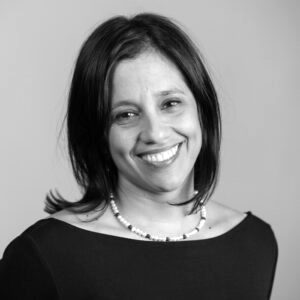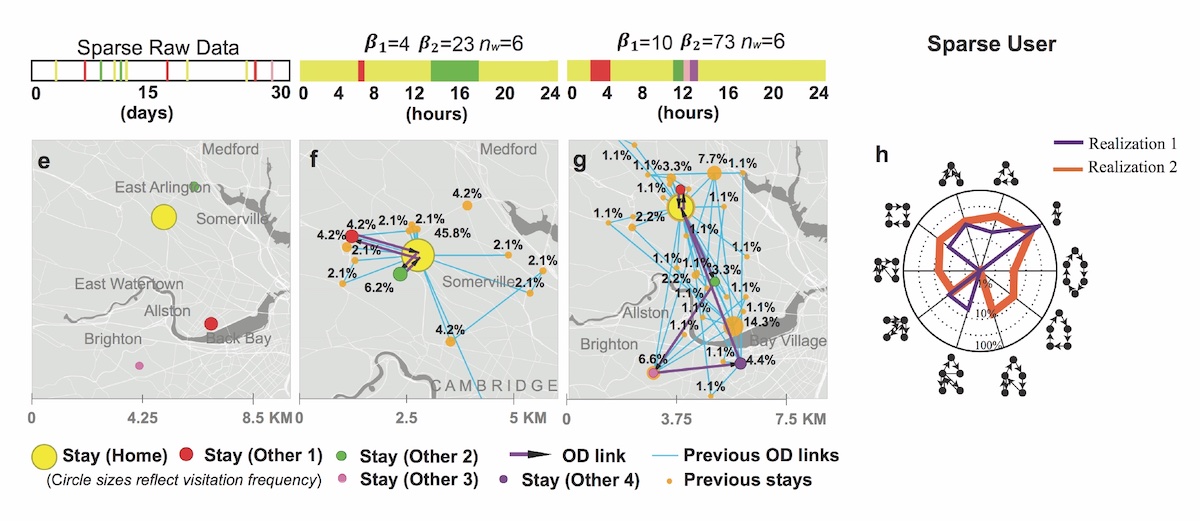
Marta Gonzalez
https://ce.berkeley.edu/people/faculty/martag/publications
https://bids.berkeley.edu/people/marta-c-gonzalez
SPECIALIZATIONS
Statistical physics of complex systems and network science founded my scientific approach. Spatial AI, digital traces, and environmental data keep me busy.
PHILOSOPHY STATEMENT
Year after year, the urgency grows: a disparate quality of life and quality of services in urban populations, inflict adverse impact on our natural and social environments. Unaffordable housing, acute pollution, power outage and congested travel are some of the challenges at hand. In the years to come, my goal is to educate future generations and to continue developing a flexible research agenda to understand, address, and reverse the negative effects in the most challenged cities.
Our research approach is based on spatial analysis, with a focus on the intersections of people with the built environment and their social networks. A complex systems approach, with statistical physics methods empowered by AI, seeking to understand macroscopic phenomena in terms of the microscopic dynamics of the various systems. We convert data into knowledge to guide interventions and planning of cities.
BIOGRAPHY
Marta Gonzalez is Professor City & Regional Planning and Environmental Engineering at UC Berkeley. She is Director of HuMNet Lab, where she and her colleagues develop numerical models and computational tools to better characterize and understand human interactions in the built and natural environments. Gonzalez is also a Physics Research faculty in the Energy Technology Area (ETA) at the Lawrence Berkeley National Laboratory (Berkeley Lab). Gonzalez’s research focuses on urban sciences, with a focus on the intersections of people with the built and the natural environment and their social networks. Her ultimate goal is to design urban solutions and enable caring development in the use of new technologies. Gonzalez has developed new tools that impact transportation research and discovered novel approaches to model human mobility and the adoption of energy technologies. She is a recipient of the prestigious Joseph M Sussman Prize for Frontiers in Built Environment best article award in 2021, the UN Foundation award in support of her research studying the consumption patterns of women in the developing world in 2016, and the Bill and Melinda Gates Foundation award to study access to financial services in the developing world in 2016. In 2023, she was named fellow of the Network Science Society for her seminal contributions to our understanding of human mobility and transportation networks, and for applying network modeling to solve societal problems in urban systems, and in 2024 she received the Lagrange-CRT Foundation Prize for her scientific research in the field of complexity sciences, its applications and dissemination.
COURSES TAUGHT
CE 88: Data Science for Smart Cities
CYPLAN 257: Data Science for Human Mobility and Socio-Technical Systems
CYPLAN 290: Urban Systems and Network Science
CE 263N: Scalable Spatial Analysis
AWARDS & RECOGNITION
2024 Lagrange–CRT Foundation Prize for her scientific research in the field of complexity sciences, its applications and dissemination
Network Science Society Fellow, 2023
Research paper award in IEEE Transactions on Intelligent Transportation Systems (top research paper between 2010 and 2019)
Joseph M Sussman Prize, Frontiers in Built Environment best article award in the Transportation and Transit Systems section (2021)
Selected speaker by the U.S. National Academies to Sackler Colloquium on Visualization and Modelling on advances of Science and Technology (2017)
UN Foundation award to study consumption patterns of women and girl in the developing world (2016)
Bill and Melinda Gates Foundation award to study access to financial services in the developing world (2016)
Invited Speaker, National Academy of Sciences meeting on "Data-driven City Planning and Policy," from the Committee on Applied and Theoretical Statistics (2016)
Winner of the MIT-Philips Lighting Grand Challenge (w. Post-doc) (2016)
Invited Speaker, National Academy of Engineering meeting -AAES Convocation of the Professional Engineering Societies on "Big Data in Civil Engineering" (2015)
1st Prize MIT Big Data Transportation Challenge "Prediction Algorithms" (w. Students) (2013)
2nd Prize, MIT Big Data Transportation Challenge "Visualization Platform." (w. Student) (2013)
Best Paper Award in the ACM SIGKDD International Workshop on Urban Computing, KDD'13, Chicago. (w. Students)
Selected by the U.S. National Academies of Sciences, Engineering and Medicine, as the organizer of the Smart Cities symposium for of the Fifth Arab American Frontiers meeting (2017)
Scientific Advisory Board Member of PTV AG, leading software solutions and consulting services for traffic and transportation (2017-2018)
Publications
Ayşe Tuğba Öztürk, Aparimit Kasliwal, Helen Fitzmaurice, Olga Kavvada, Philippe Calvez, Ronald C. Cohen, Marta C. González, "A mesoscopic model of vehicular emissions informed by direct measurements and mobility science," Sustainable Cities and Society, Volume 129, 2025,106421.
Wu, Jiaman, Siobhan Powell, Yanyan Xu, Ram Rajagopal, and Marta C. Gonzalez. “Planning charging stations for 2050 to support flexible electric vehicle demand considering individual mobility patterns.” Cell Reports Sustainability (2024).
Xu, Y., Olmos, L.E., Mateo, D., Hernando, A., Yang, X., and Gonzalez, M.C., “Urban dynamics through the lens of human mobility”. Nature Computational Science (2023).
Lukas Ambuehl, Monica Menendez, and Marta C. Gonzalez, "Understanding congestion propagation by combining percolation theory with the macroscopic fundamental diagram," Communications Physics 6, 1 (2023).
Y He, S Lindbergh, Y Ju, M Gonzalez, and J Radke, "Towards Resilient Critical Infrastructures: Understanding the Impact of Coastal Flooding on the Fuel Transportation Network in the San Francisco Bay," ISPRS International Journal of Geo-Information 10(9), 573 (2022).
A Salgado, W Li, F Alhasoun, I Caridi, M Gonzalez, "Street context of various demographic groups in their daily mobility," Applied Network Science 6 (1), 1-14 (2021).
Y Xu, LE Olmos, S Abbar, MC González, "Deconstructing laws of accessibility and facility distribution in cities," Science Advances 6 (37), eabb4112 (2020).
LE Olmos, MS Tadeo, D Vlachogiannis, F Alhasoun, XE Alegre, C Ochoa, Felipe Targa, Marta C González, "A data science framework for planning the growth of bicycle infrastructures," Transportation research part C: emerging technologies 115, 102640 (2020)
Barbour, Edward, Carlos Cerezo Davila, Siddharth Gupta, Christoph Reinhart, Jasleen Kaur, and Marta C. González, “Planning for sustainable cities by estimating building occupancy with mobile phones,” Nature Communications 10, no. 1 (2019): 1-10.
Olmos, Luis E., Serdar Çolak, Sajjad Shafiei, Meead Saberi, and Marta C. González, “Macroscopic dynamics and the collapse of urban traffic,” Proceedings of the National Academy of Sciences 115, no. 50 (2018): 12654-12661.
Di Clemente, Riccardo, Miguel Luengo-Oroz, Matias Travizano, Sharon Xu, Bapu Vaitla, and Marta C. González, “Sequences of purchases in credit card data reveal lifestyles in urban populations,” Nature Communications 9, no. 1 (2018): 1-8.
Xu, Yanyan, Serdar Çolak, Emre C. Kara, Scott J. Moura, and Marta C. González, Planning for electric vehicle needs by coupling charging profiles with urban mobility,” Nature Energy 3, no. 6 (2018): 484–493.
Albert, Adrian, Jasleen Kaur, and Marta C. Gonzalez, “Using convolutional networks and satellite imagery to identify patterns in urban environments at a large scale,” In Proceedings of the 23rd ACM SIGKDD international conference on knowledge discovery and data mining, pp. 1357-1366. 2017
Jiang S., Yang Y., Gupta S., Veneziano D., Athavale S., and Marta C. González, “TimeGeo: A spatiotemporal framework for modeling urban mobility without surveys,“ Proceedings of the National Academy of Sciences 113, no (37), E5370-E5378 (2016).
Toole J.L., Colak S., Sturt B., Alexandre L., Evsukoff A., and Marta C. González, "The Path Most Travelled: Travel Demand Estimation Using Big Data,“ Transportation Research Part C: Emerging Technologies 58, 162-177 (2015).
Toole J.L. , Herrera-Yague C., Schneider C.M., and Marta C. González, "Coupling Human Mobility and Social Ties Social Ties,” Journal of The Royal Society Interface 12(105), 20141128 (2015).
Yang Y., Herrera-Yague C., Eagle N., and Marta C. González, “Limits of Predictability in Commuting Flows in the Absence of Data for Calibration,” Scientific Reports 4, 5662 (2014).
Schneider C.M., Belik V., Couronne T., Smoreda Z., and Marta C. González, “Unravelling Daily Mobility Motifs,” Journal of The Royal Society Interface 10(84), 20130246 (2013).
Toole J.L., Cha M., and Marta C. González, “Modeling the Adoption of Innovations in the Presence of Geographic and Media Influences,” PLoS ONE 7 (1), e29528 (2012).
Gonzalez M.C., Hidalgo C.A and Barabasi A.-L., “Understanding Individual Human Mobility Patterns,“ Nature 453, 479-482 (2008).
Wang P. and Gonzalez M.C., Hidalgo C.A and Barabasi A.-L., “Understanding the Spreading Patterns of Mobile Phone Viruses,” Science 324, 1071-1076 (2009).
Simini F., Marta C. González, Maritan A., Barabasi A.-L., “A Universal Model for Mobility and Migration Patterns,” Nature 484 (7392), 96-100 (2012).
Gonzalez M.C., Hidalgo C.A and Barabasi A.-L., “Understanding Individual Human Mobility Patterns," Nature 453, 479-482 (2008).
Wang P. and Gonzalez M.C., Hidalgo C.A and Barabasi A.-L., “Understanding the Spreading Patterns of Mobile Phone Viruses," Science 324, 1071-1076 (2009).
Simini F., Marta C. González, Maritan A., Barabasi A.-L. “A Universal Model for Mobility and Migration Patterns,” Nature 484 (7392), 96-100 (2012).
Wang P. and Gonzalez M.C., Hidalgo C.A and Barabasi A.-L., “Understanding the Spreading Patterns of Mobile Phone Viruses”, Science 324, 1071-1076 (2009).
Gonzalez M.C., Hidalgo C.A and Barabasi A.-L., “Understanding Individual Human Mobility Patterns,“ Nature 453, 479-482 (2008).
Simini F., Marta C. González, Maritan A., Barabasi A.-L., “A Universal Model for Mobility and Migration Patterns,” Nature 484 (7392), 96-100 (2012).
Wang P. and Gonzalez M.C., Hidalgo C.A and Barabasi A.-L., “Understanding the Spreading Patterns of Mobile Phone Viruses,” Science 324, 1071-1076 (2009).
Gonzalez M.C., Hidalgo C.A and Barabasi A.-L., “Understanding Individual Human Mobility Patterns,“ Nature 453, 479-482 (2008).

